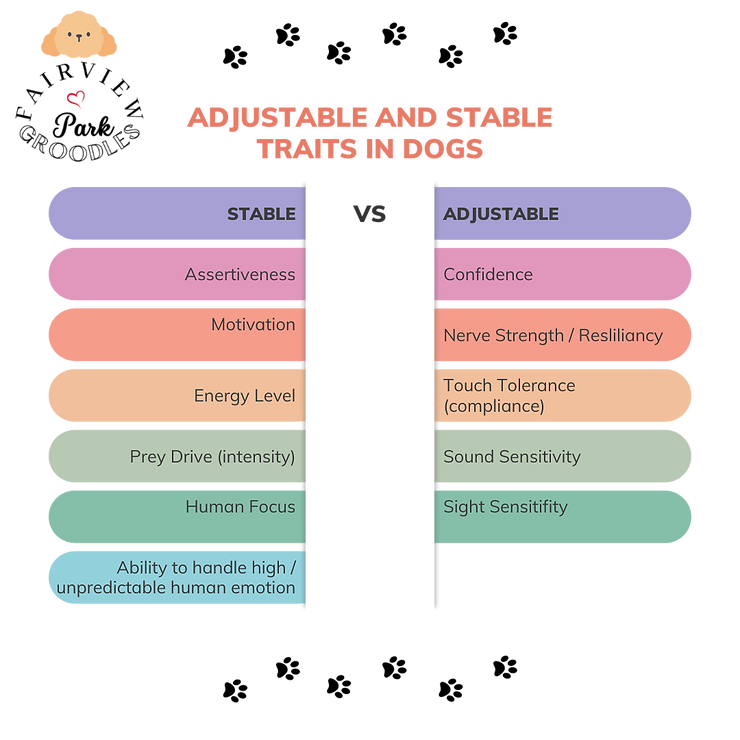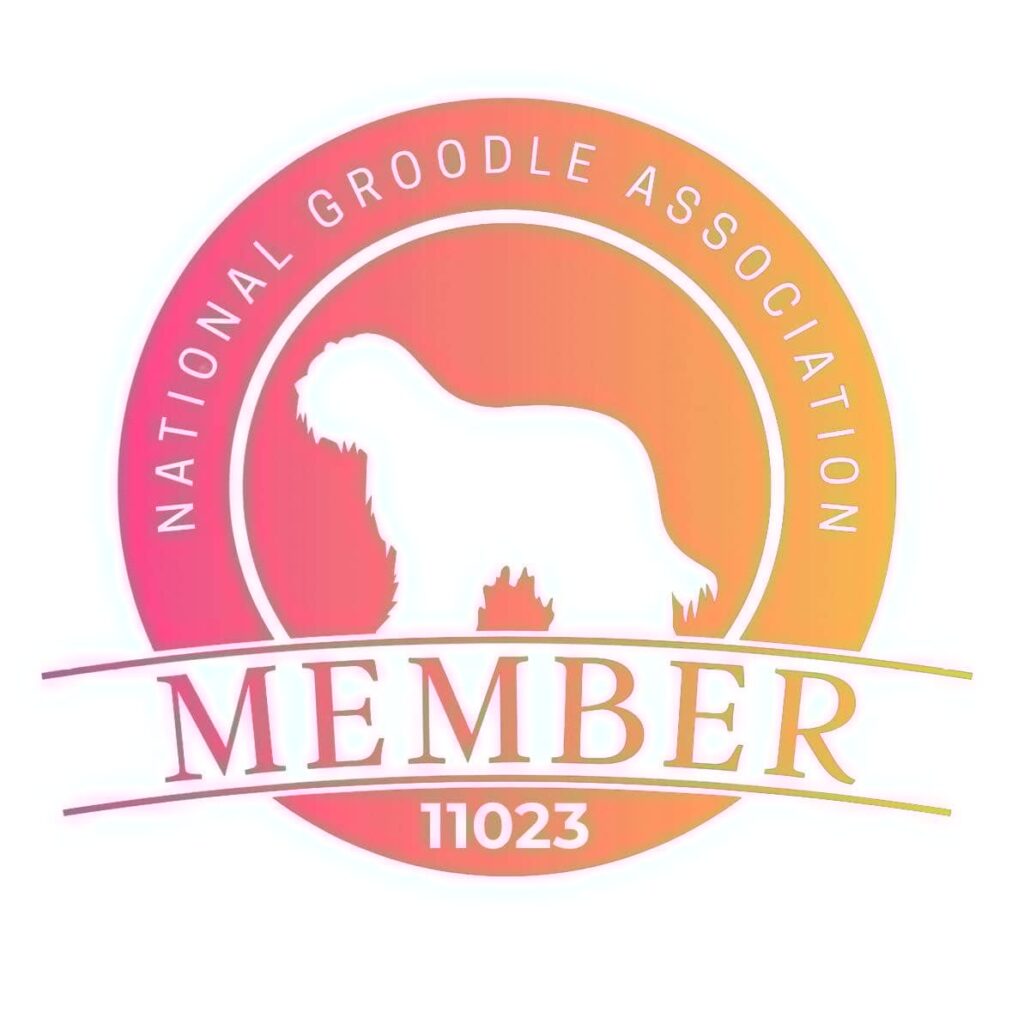Introduction
Bringing a new puppy into your life is an exciting and joyful experience. Puppies come in different breeds, sizes, and colours, but they also have distinct personalities. Just like humans, puppies possess unique temperaments that influence their behaviour, trainability, and compatibility with their future owners. In this blog, we’ll delve into the fascinating world of puppy curriculum and temperament testing, exploring its purpose, methods, and benefits.
Purpose and place in curriculum
Whatever needs you have for your dog, it is critical to have as much information as possible when selecting your puppy to ensure it is a good fit for your lifestyle and what you are wanting to experience with your dog.
Most people will have their own unique needs for a dog, though for some their puppies traits will be more critical than others in meeting those needs.
A breeder who runs a puppy exposure curriculum for their litter is helping prepare the puppies for the next stage of their lives, however this is only half the picture.
All dogs have a set of definable traits that we use to assist with assessing suitability for certain situations. They have many more, but these are the ones we consider important in determining this suitability. 50% of these traits are adjustable (i.e. can be conditioned and improved upon through a purposeful and outcome-based puppy curriculum and aligned follow on training once they go home with you) but 50% of those traits are stable, meaning conditioning or training will not have much effect on these traits. This is where the power of puppy aptitude testing (or evaluations as we call them) come in, as we assess the intensity of all of the adjustable and stable traits and you have a comprehensive picture of what the puppy you are picking has in their behavioural makeup, what you can work on and you an accept (what is likely to just be).
Accuracy and Reliability
The accuracy and reliability of puppy aptitude testing depend on several factors, including the test design, the environment in which it is conducted, and the consistency and experience of the evaluator’s scoring. Tests administered by experienced evaluators in a controlled environment tend to yield more reliable results. Additionally, tests should be conducted when puppies are between seven and eight weeks old, as this is a critical developmental stage when their personalities begin to solidify but before they enter new fear periods.
While no test can guarantee future behaviour, research and anecdotal evidence suggest that well-designed aptitude tests can be effective predictors of a puppy’s potential suitability for specific roles. For example, puppies that score low in sociability, resilience or are anxious or nervous are not likely to succeed in therapy and assistance work, where confidence and sociability are essential.
Stable vs Adjustable Traits

Source: adapted from Forrey, J. (2020) The Ultimate Badass Breeder’s Guide. Jeanette Forrey.
Experienced evaluators are very aware that only half of the traits tested are stable, i.e. what we test at puppyhood is largely going to remain during the puppies life.
However the other half of the traits are adjustable, and this is where it is definitely possible that these traits can change over the life of the dog.
How the information is used
These adjustable traits can be a good thing where they are lower or higher than we would like them to be, and while we work really hard on building these traits positively through our puppy curriculum, we also have to educate our puppy parents that they need to continue to work on these things through socialisation and training for these traits to remain or improve in their puppies. If this does not happen a pup that was, for example, previously confident with high resiliency could lose this going into adulthood; conversely, if these traits tested lower than what is ideal, being aware and working to improve on them can see them improve significantly and is exactly what a good socialisation and training program aims to do. Being aware of these traits as they stand at a point in time when pups are malleable and can be improved is vastly important information for any new owner to have.
Moreover, when it comes to the stable traits, this information is even more valuable. While training and management strategies can definitely assist, you are not going to see a lot of change in the dogs tendency towards these traits. Knowing a dog has, for example, high energy, assertiveness and/or prey drive is vitally important in guiding placement for these puppies. A home with young children or less active retirees is not going to be ideal for this dog. But a highly active couple without children are less likely to have problems. A dog that feels highly responsible for human emotions are not likely to work out well for a person wanting a therapy dog in a counselling practice, this is simply not fair to the pup and not setting anyone up for success.
It’s still about choice
I cannot stress the importance of this enough. Our clients, in waiting list order, get to pick their puppy. They do so, however, with very comprehensive information and are able to make a highly informed choice. Clients often ask for advice and guidance when making their decision, which is absolutely fine but the final choice is theirs. One important point to make here though is that if a client did choose to pick a puppy I did not think was suitable for their purposes, I would strongly advise another choice and/or make sure they were fully aware of the implication of this choice.
Our Results
We survey all of our puppy owners at 12 months and 2 years after their puppy has joined their family and 90% say the evaluation results were accurate through to adulthood. For the other 10%, they still report high levels of accuracy however they’ve seen some changes in the adjustable traits, which does come down to follow on training and consistency as those traits can definitely change through training and conditioning (in both good and bad ways!). All feedback collected assists us to tweak and fine-tune our program and after-sales support.
The feedback we get from our clients is highly positive after they go home in getting a dog that was suited to their environment and their needs and wants from a dog and the curriculum prepares them so well for their future lives.
For our program, this makes it worth doing and while evaluations will not say a dog is 100% going to be suitable for what the client wants it for, it is far better than guessing.
Credits:
Our knowledge on this topic comes from mentorship through the Badass Breeder (BAB) Program. and completing and being accredited in advanced puppy evaluation training through this program The content of this blog is largely derived from knowledge gained through this program and many years of conducting evaluations using this methodology and experiencing the results first-hand. Jeanette Forrey from 4E Kennels and the developer of the Badass Empowered Breeder Program is amazing and shares her knowledge freely and at a low cost. Any breeder would benefit from becoming familiar with this program.






